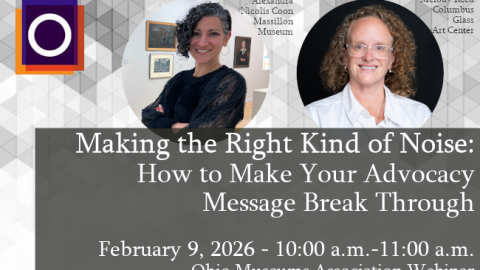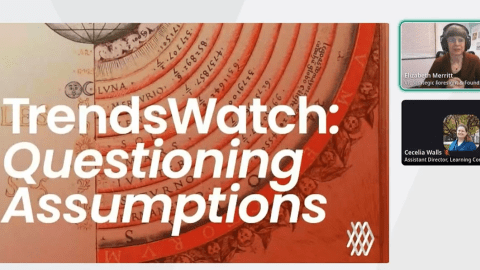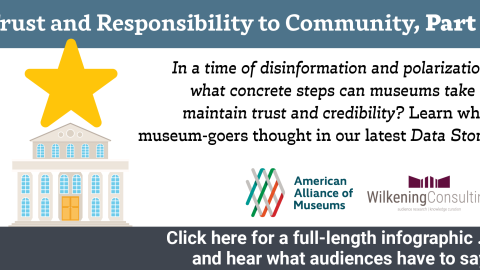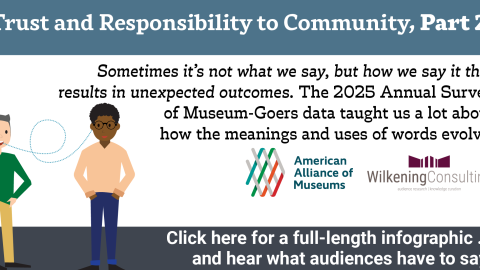I recently contributed to a discussion hosted by the Cooper-Hewitt Museum/Parsons School of Design on the future of museums and what a museum studies program there could do to benefit future museum professionals. I wasn’t able to attend the physical conference in New York on June 22, but I spoke with Sarah Lawrence, director of education at the Cooper Hewitt phone, before and after and read the blog recording the thoughts of attendees. Here are three points that evolved from these discussions:
Start Before the Students Matriculate
What is the responsibility of museums and museum studies programs to shape the composition of the field? Right now, we are about 80 percent Caucasian and 80%, female. This creates two unhappy groups: museums as employers who want more diverse staff and complain that they cannot attract ethnically/culturally diverse, qualified candidates and museum studies graduates bearing large amounts of debt from student loans, who are unhappy that they are underpaid compared to the jobs they could get with their level of education.
These parallel problems suggest a potential solution. Stop hiring museum studies graduates. Museums could go instead to their local high school or community college, whose students are more likely to reflect the composition of their community and neighbors and convince some of the best and brightest students that museums can be a good career choice. They could offer to support the students’ continued education (including specialized museum training) on the job, and if they need other kinds of support (daycare, flexible hours, transportation allowances), provide that as well. We may well find a cadre of bright, diverse young adults for whom the salary you offer is competitive with their alternatives, while the work might be a hell of a lot more interesting.
If the norm continues to drift towards a museum studies degree being a prerequisite for museum work (though I am not sure that we are moving in that direction), then I think that museum studies programs bear some responsibility for actively recruiting a diverse student body. Again, this may mean actively courting diverse students on their home turf, providing scholarships, lining up work-study opportunities and convincing these young people that museum jobs (curation, education, registration) are desirable careers.
Mainstream the Students
With the plethora of social media available to connect students to the wider community, why not do so from the beginning of their training? If students are going to be asked to do research, they should be encouraged to a) open it up for ruthless peer review of its quality and utility and b) share the results online in an indexed, organized way so that it doesn’t add to the overwhelming body of gray (unpublished) literature that hides in files doing no one any earthly good. Besides, once students are encouraged to reach beyond the boundaries of their program, via the Internet, they could begin their apprenticeships with museums from day one. Pair each student with a small museum that needs help researching collections, maintaining its website, developing marketing material, etc. Or encourage them to enroll as virtual volunteers with larger museums that have the resources to coordinate sophisticated online projects in design, data collection or analysis. A few museum graduate programs – notably the program at Johns Hopkins University – are already moving online.
Reevaluate the Curriculum
I continue to think the most valuable foundation for almost any museum-specific position (registration, curation, education) is a deep grounding in some area of expertise. Any area of expertise, in fact—art, history, the taxonomy of wombats. The drawback is that many people who self-select to delve deeply into, for example, wombat anatomy, are as one friend of mine so gracefully put it, “independent knowledge workers.” They are frequently introverted, work well on their own and have been trained through the process of academic natural selection to fiercely defend their theories and positions and test those of others by ruthlessly questioning. In other words, they may not fit easily into an environment that depends on teamwork, as museum do. This mismatch is compounded by the fact that, as discussed in the CFM report “Museums & Society: Trends and Potential Futures,” we are entering an age in which people don’t just want to be lectured to by experts, they want to contribute and curate their own content. In this environment, curators may evolve from being lecturers and authors to being moderators of discussions and editors of content. This requires a different set of soft skills and calls for a different set of training. Is this something that can be provided at the graduate level in an academic environment, or is it best learned (and consciously taught) on the job?
As always, I hope to provoke you to respond. So, you recent museum studies graduates—was the debt worth the degree? What training was the most useful, and what in retrospect do you wish had been included in the curriculum? And museum employers—are you looking to museum studies programs as your primary source of future workers? And if you are actively trying to recruit a more diverse professional workforce, what are your strategies?









Let us make some museum jobs available first.
-A museum studies MA graduate that has observed no appropriate museum openings in her region the past year.
I doubt you meant to offend, but proposing that you go to community colleges where the underrepresented folks are to recruit and give them help overcoming their obstacles is an incredibly patronizing way to look at it.
During my first week as a museum employee, I went to an all staff meeting where a woman gave a presentation on the successes of a program to reach out to underserved communities. Why we've even hired people of color. As a new hire and a man of color, I shrank in my seat. When she started naming employees of color in professional jobs, I sank in even more. When she neglected to call me out, I was both relieved and horrified.
If the museum world wants to improve the diversity of its staff, it needs to solve the problem of the diversity of its audience. I'm willing to wager that most of us in museum careers were museum goers to start with.
I have several problems with conversations of this sort, most of them having to do with definitions and assumptions. When you say that museums might stop hiring museum studies students, what is your evidence that museums are in fact hiring them in large numbers as compared to graduates from other types of programs whether content specific (art history, history, the sciences) or other professional degrees like Public History or Science Education. What about museum specific programs that are not called "Museum Studies" like Museum Education programs or Conservation training. Does a person who has an MA in something like History or American Studies but a certificate or concentration in museum studies count as a graduate of a museum studies program?
Speaking as a person with 20+ years experience in museums of science and history and has hired dozens if not hundreds (if you count PT) of people I can honestly say Museum Studies graduates (if you only count those with degrees in programs called "Museum Studies") have always been very much in the minority of my hires. This is for a lot of legitimate reasons mostly having to do with geography (not all regions are equally served by Museum Studies programs) and content (Museum Studies programs tend to produce art museum people not so much science and history). But if you count Public History programs or graduates from History, Science, or education programs with concentrations or certificates in Museum Studies, it becomes a much higher percentage.
Until discussions like this define terms, boundaries, and assumptions and can point to baselines of hiring practices, graduation rates, and demographic data I'm not sure how informative they are. If there are such studies, please post.
So to turn it back to you, what do you mean by "museum studies?"
I can only speak from my personal experience. I worked in a museum BEFORE getting my Master's degree in Museum Professions. It was a great job but I eventually realized that I didn't know some of the very important things I needed to know in order to properly do my job. My experience there was precisely what led me to continue my education and get my Master's degree.
Now I am having difficulty finding a museum job. I believe that professionalism is necessary in this field, both for the safety of museum objects and for keeping the public's trust in museums as a resource. I don't regret furthering my education, but I do believe that recent graduates and the museum world need to expand the idea of "museum professionals." Independent museum professionals may be the key for both museums and graduates.
Graduate programs are not the end all, be all, are often necessary requirements for certain positions, and I would hope that students enrolled in museum studies graduate programs understand that they need to make an effort outside of the classroom to volunteer or intern with museums at the local level in order to apply their education. My arts and administration program facilitates many such opportunities for us to connect to arts organizations and museums in our state and beyond, and additionally encourages us to widen our net of knowledge. I have done this by taking art history classes, educational courses, and nonprofit management courses. Many of my peers are pursuing a certificate in non-profit management, and are learning many skills in the classroom, including creating and analyzing financial documents, a skill that could potentially take much more time and trial and error to figure out in the field.
Just as with any profession, a higher degree is a great resume boost and does provide the individual with professional development, research skills, context of the field, and an excellent network of peers, in addition other knowledge and skills.
The point is not to eliminate the hiring of professionals from museum studies programs. The point is for arts and administration, arts management, curatorial degree, and museum studies graduate programs to extend their reach to those from different cultures, ethnicities, and socio-economic positions, in addition to offering a more diverse range of course-work, opportunities for professional development, and expanded skill requirements.
http://mjwrites.wordpress.com/
Although it is an intrguing idea to push for more applicants from community colleges and other programs to increase diversity in the professionals working in museums, there are a few problems that affect me personally (and onot only myself, I would wager).
I absolutely believe in diversity in both museum professionals and museum audiences. Yet if we disregard students that have put money and time into museum studies-they should not be rewarded? I have put over 6 years of heart and soul and more money than I care to admit into training myself to be a museum professional. I absolutely think I deserve to be considered for museum work!
I agree with Willy L- there needs to be more done to reach diverse audiences- if potential visitors have a negative view of museums or believe they don't "belong there" why in the world would they aspire to work there?
In regards to pre MA/ post MA experience, I am also not having much success finding suitable museum employment. I was gainfully employed at a museum before my MA, but was told I could not "go up the ladder" without a Masters. Now, I have found only short term contracts. Does this have to do with my education, budget cuts and/or or the recession? There are a lot of layers here, and no easy answers.
I am really enjoying these comments!
Oh boy. This is my sticky wicket. Posts like this make me feel like “oh you made a crappy decision, getting your degree – you should have been able to teach yourself this stuff.” I don’t think this is intentional, just my reaction whenever I hear the argument.
Briefly, first reactions: I think it is on the onus of the program to be as candid and scary about the field as possible. I also view education as valuable in itself, not a job-placement mechanism.
Getting to the core of it though, is previous commenter named Willy: “If the museum world wants to improve the diversity of its staff, it needs to solve the problem of the diversity of its audience. I’m willing to wager that most of us in museum careers were museum goers to start with.”
Here’s my context: I entered into the museum field about 9 years ago with no museum experience other than an undergrad art history degree and an internship at a small gallery during my senior year. After college, I scheduled tours and worked with docents – a solid and wonderful entry level position. Fast forward a few years, and the on-the-job training led me to public programming. Six years in, I had little professional development, nor deep background to learning theory or developing diverse audiences. I wasn’t aware that there was a whole slate of concerns in the field, and was perpetuating a historical and small way of doing things.
And so I’d go to work every day doing what was expected, and being flummoxed by what wasn’t working, why my audience all looked the same and came from the same part of town, not knowing where to turn to find out more or solve these problems. I’m an intelligent kid; it wasn’t a willful stubbornness. I also knew that if I were to continue down this path, I’d burn out and change career paths. And I’m awesome. (A lot of us are.) Our field needs me, even though I start sentences with “and” and end them with prepositions. Thus I heavily researched museum studies programs nationwide, finding ones that were focused on giving you a piece of paper with the MA on it, and some of course were dedicated to much deeper scholarship, which is the program I ended up studying with. I knew how to do things, but had no idea why. In order to reconnect with my career, I needed to know why.
I think it is dangerous to assume all museum studies programs are the same. You could branch out and take a look at other graduate degree programs to see what type of diverse background their students come from. Why is there a dearth of women in engineering schools?
Is there an AAM accreditation system for MA programs? Perhaps that is a quick and short-term answer? Assuring that a new set of practices are being paid attention to? Or are museums themselves responsible for developing a generation of professionals? How many museums do this already? I’d be interested to see which museums can do that, with the funding and operational stringency we have continually been saddled with.
I think the bigger and more important issue is whose responsibility is it to make sure our cadre of colleagues including the next generation is engaged, innovative, open, communicative, positively pushing the field forward, and works their tails off? It is way complicated to design an exhibition for multiple audiences, learning levels, motivations, needs, wants, etc. As a brilliant colleague of mine said earlier today, “This *is* rocket science.”
While I can’t bemoan that I was hired without a deeper knowledge of why I was doing what I was doing, I do kick myself knowing I could have come into that position and contributed a vast amount more; not just to my beloved museum, but to the field at large. In short, I think blaming museum studies programs is a much too easy way out of it, where the answer is much more difficult and disparate. What other industries have unequal ratio of qualified applicants to available openings?
Lastly: I’d like to connect with all the commenters here-brilliant people, you.
I feel compelled to point out that you have suggested not hiring Museum Studies grads as a "solution" to the problem of student debt and low wages. This is your "vision"?
10 years after graduating with an MA in Museum Studies, I am still saddled with debilitating debt. At grad school I was able to meet those who ended up hiring me, but 80% of what I do, I learned on the job. There are many roles in a museum, and unless you're a curator who needs a pHD or a conservator who needs specialized training, the rest is not rocket science. As Koko500 pointed out, it just requires people who are "engaged, innovative, open, communicative, positively pushing the field forward, and work their tails off." And I would add, people who think creatively and are brave to try new things.
Was the debt worth the degree? Of course! Anyone who pursues an advanced degree had better be doing it because they love it rather than simply to get a job. This point was repeatedly told me when I received my MS in History. It was not really mentioned when I was getting my MA in Museum Studies but I was aware that money was not going to be on par with my education level. (Everyone should do some research into the job outlook and salaries when contemplating education for employment) 2 years later and I am still only working part time and way less than I have made in the past. But I love my job and hope to eventually have both fulltime and more lucrative employment in the field. I have no idea what degrees are being hired but jobs are out there. Like a previous commenter it seems most are not in my geographic area and would require relocation…but this is becoming more and more common in the work environment regardless of the job being sought. I talked to numerous directors during my Museum Studies program and the consensus was the most important part of getting a job in a Museum is having done volunteer and/or internships. They felt the degree was unimportant without experience and a work/volunteer history that shows a dedication to the field.
I would agree the field seems to be majority female but I am certainly not alone even in my locale. I don’t know if it still holds true but I once read a sociological study that says that males in a female dominated field are forced to the top to administrative and higher paying positions on the “glass escalator” by their female colleagues. A recruitment tool for males? Hopefully salaries will become more commiserate with education regardless of gender but it is not like this is the only field whose education and or risk level is much higher than the pay would seem to indicate.
I think recruiting of a diverse museum workforce is good and essential but the idea of ignoring professionally trained people to do so is ludicrous. Education is becoming more and more a determining factor in hiring across the board. Improve education opportunities for everyone and recruit to programs for a diverse base but don’t deny educations worth.
Posted on behalf of LVIP:
"Subject Matter Expertise is So Important
Your comments about needing some specialty are right on target. Particularly for those students who want to work in university museums, or federal or state museum systems, they will need to have one, even if it is a strong knowledge and expertise in governance models, or audience studies, or social theory about charitable giving. What the programs today tend to produce are budding academicians with a vocational knowledge of cataloguing technique and a dogmatic approach to collections care and ethics. It is tough to be a generalist when one starts. It gets easier as one spends a career in the field. I took a Museum Studies minor over 30 years ago, from a program that no longer exists but that has some distinguished graduates. We all knew that the Museum Studies minor was adjunct to our disciplinary studies, which gave us a certain standing and starting place in the field. The students were only 70% female in those days.
My favorite example of a useful museum studies program is the Museum and Field Studies program at the University of Colorado (http://cumuseum.colorado.edu/MFS/). They offer graduate courses to students from seven or eight disciplines who bring their developing expertise with them, either for an M.S. or a graduate certificate in Museum Studies (this is also a tuition cash cow for the U, which appreciates that and supports it well). What the program does is provide proper socialization for the scientists so that when they affiliate with a museum they are better prepared for teamwork and the knowledge of how museums are evolving. For the graduate students pursuing general or specific museum work there is a realistic assessment of future opportunities, particularly in collections stewardship where their placement rate has been admirably high at major institutions.
I am also a fan of graduate programs that attract students older than traditional age, such as the Harvard program (http://www.extension.harvard.edu/museum/). The students have already gotten some life and work experience and tend to apply themselves diligently because they know what they are looking for by the time they are in their late 20's or early 30's. Often they have also established long-term marriages or partnerships that are supportive of the work and the study and ease the path to further study and advancement. Concentration on important current issues is a part of this program, and adds greatly to their store of expertise.
For students with lower expectations, your idea about vocational training at local schools could be another career path. I am not sure how much that will address the diversity picture, really.
Gender and Generation Are Challenges
Here is my description of the stereotypical graduate of a museum studies program in the western part of the country: A smart young woman, armed with lots of generalized knowledge about museums and how they should be, taught by university professors, some of whom have never worked in a museum in the real world. As a member of the emerging generation, she wants to be in charge right away, figuring that her studies were enough dues to pay and that traditional starting roles would be both boring and low paying. She is fortunate enough, through connections, to find a job as director of the local historical society in East Jesus, Texas. She has a 1,000 sf museum complete with a two-headed calf and the baptismal clothing of the first white child born there. She has a volunteer secretary and no other help, while the board of 25 people is made up of 70+ year olds, all of them very conservative. Besides the challenges of improving the museum, she finds that there are very few people of either sex her age with whom to be friends or even acquaintances. She starts looking at the AAM job site after her first month on the job, hoping to spin herself up to the next higher circle of hell in a larger city. She might also consider going back for another advanced degree in social sciences.
(cont.)
LVIP comments, cont.
"There is still something to be said for paying one's dues and carefully considering career moves. I am frequently asked by emerging female professionals what that path should be, and I usually give them the example that I know has worked very well for the boomer generation (and you can probably see this in almost every female member of the AAM Board, for example). Take the crap job (with insurance) in your 20's, learn more, have your kids if you want them, and prepare. Seek promotions and more leadership responsibility while you are raising your kids. When you are in your early 40s and have more time to yourself, go for it and kick ass as a director for the next 20 years and enjoy the congratulations of your peers and your family. Then become an independent professional and share your knowledge with individuals and institutions.
The internships offered through most programs can be either very helpful, or discouraging. If the work is real and there are some rewards (even pay) then a career can be born. If the work isn't real or if it is in the rarified atmosphere of a top tier institution, it can be demoralizing when one next ships out to East Jesus. That said, museum studies programs could be more creative in their internship programs, seeking partnerships with museums, foundations, and financial aid outlets as you suggest.
The gender perception is so engrained, and has been. That is changing as many more women are taking the top spots, because I find those individuals to be fair in mentoring both young men and women. When I started out, I remember feeling like some of my Native American and Hispanic friends who live in two or more worlds – I was from a middle class background, and NOKD (not our kind, dear) to some of my patrons, while at the same time I had uncles who did not think that museum work was a "manly occupation". Overall I think the gender imbalance is related to the decline in male college enrollment, which no one seems to be able to explain fully.
Diversity Ideals Can’t be Forced or Faked
Cultural diversity is most difficult to achieve in some parts of the country. I agree with the above post that suggests museum people tend to start as museum-goers, no matter what their background. That evolution is a long-term process that includes the rise of many culturally specific museums from which museum professionals may come in the future, or to which they may be drawn from mainstream museums. Nothing wrong with that, and perhaps we shouldn’t be obsessing about it but rather find other ways to recruit. For example the recipients of Coming Up Taller awards could be employed to recruit good students who have shown an interest and involvement during their high school years.
Thanks for posting the discussion. There is work to do.
LVIP
I am sorry to say I find every aspect of your argument to be incorrect. I am an arts professional of color, with an MA degree in Curatorial Practice (contemporary art history + museum studies) from a well-respected academic institution in the field. I live in a diverse community with many museums and galleries. I have had internships at major museums and have worked for blue-chip artists. Despite my achievements, my strong resume and my leadership experience, I am unable to get so much as an interview at any of the museums in my locality. This is generally explained to me as being due to my not having already worked in museums, that being a result of needing to work, and having found leadership positions in community arts organizations.
Quite simply, museum directors need to decide that diversity is more important to them than hiring the people who have worked for their friends, or the people who have worked at the national museums that trustees have heard of. You can't diversify your workforce by hiring the same people with the exact same qualifications you always have hired in the past. If museums are unwilling to mine community arts organizations, commercial galleries and alternative spaces for talent, there will continue to be an impermeable barrier between these (much more diverse) sectors of the arts economy and museums.
I am impressed with the variety of comments on this posting. It is clear that the field is attracting very smart and mission driven people. A MSTD degree is expensive yet in the long run is worthwhile. I received a museum studies degree in the late 60's which helped me get a job. I went back to school to get an MBA and have believed in a pattern of personal self-development throughout my career. There are lots of things that lead to success…having the right mentors, being willing to work hard and take risks. In a recessionary period, its easy to be depressed about job options. Things will get better in time. Museum Studies programs vary widely in their curriculum and academic focus. There is no standard. My feeling is they can be of great assistance to career development; but they have to be responsive to the needs of the field.
Interesting read. I think many of the conclusions are wrong. I'm going to throw in my two cents as a museum studies student.
1) The museum industry is 80% female and white because they generally pay crap and statistics show women are forced to earn less than men(thus their dominance of non-profit non-management positions), and because museums have done a relatively poor job (though getting better) of consistently serving and connecting with underserved communities (ie poor minority communities beyond just the obligatory school groups)… so guess who is left to be most interested in museums? Please. Dont blame it on us museum studies students when its the museums that are at fault.
2) Most of the people I've met who already work in museums DON'T have a museum studies degree or didn't have one when they started so its bullcrap that museums should stop hiring museum studies graduates when then don't hire them exclusively in the first place. In fact, I once had a museum director confide to me (who shall remain unnamed) that she believes there is some pervasive doubt in the industry about the value of a museum studies degree. I don't know if this is totally true either but clearly, since a museum studies degree is a general degree, most graduates are NOT the most qualified candidate for any museum position other than an entry level one, unless they possess some other specialized skills or experience.
While I DO agree strongly with the blog article that museums should diversify their recruitment into the very communities that they underserve, I also think a museum studies degree shows that someone is deliberately and specifically interested in the field of museums. Why would you NOT want to hire those who have a specific interest in your field???
"We may well find a cadre of bright, diverse young adults for whom the salary you offer is competitive with their alternatives, while the work might be a hell of a lot more interesting."
What the heck?! Are you really saying the solution is to recruit from the underprivileged classes because you can then reasonably continue to pay crap wages?… Thats the solution??! I'm ready to take a 50% pay cut from my current salary and sacrifice my thirteen year old career just to be able to start over and work in the field I love most and to give back to my community through museums. If AAM's Center for the Future of Museums is arguing that the best road to diversity is not to hire museum studies graduates like I soon will be, I might as well throw in the towel here and now and sell my soul to the corporate world, since my own tribe is calling for rejecting warriors passionate about museums like me. Indeed! 😉
P.S. – Oh… and I am male and non-Caucasian, so us museum studies students are not all female and white, thank you very much.
As a lowly museum studies student, the suggestions in the post are kind of frightening and nearly hit the nail on the head at the same time. I was shocked when I entered orientation last year and found that I was the only person of color, and there were about only 2 guys in the room. I've been dealing with that reality check and forming more opinions on my program experience throughout my first year. I've been weirded out by the fact that in my class I'm also in the minority in terms of previous museum experience, there seems to be a lot of folks who are there just on a whim to get a MA as means of escaping their hometown, or as some adventure of a new field. I feel like my going into my program was a last resort – this was the only way I could/would be considered for any full time employment in a museum after trying to get a 'real' job with just a bachelor's for 4 years.
I think it's on the program to let more diverse people in, and to also encourage real life experience to apply what students are learning (which my program is doing a good job of I think). I also think museums need to change their hiring practices a little too. Not necessarily recruiting from community colleges completely, but having directors and upper staff willing to teach their lower staff (budding museum professionals) some later career skills they'd be able to use, and encourage their development would go a long way too.